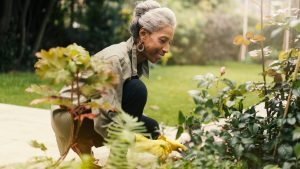
In an article for Sixty and Me I talked about how naturally occurring patterns in nature, also called fractals, are perfect for relieving stress. And that is important for you to know because your health care provider usually does not have enough time or resources to focus on anything other than medications, diagnostic testing, and perhaps a single piece of advice.
Getting an Unexpected Diagnose
And that’s the situation I found myself in when I was retiring as a nursing professor and was diagnosed with a serious autoimmune disease. Lupus erythematosus is a chronic illness, with no cure, where the body attacks itself. I was put on medication and told to avoid the sun.
At first, I was the perfect patient. I took the medication and stayed inside for almost a year. But I was feeling miserable. My emotional and mental health were suffering. It was only when I saw a comment on a forum for other lupus patients, where a fellow sufferer said that she felt so much better by going outside, that I decided I was going to give it a try.
My Outside Mindset Treatment
Almost immediately, once I stepped into the woods, I began to feel my old spark for life again. I even felt free and happy – like I did before the diagnosis. I realized that once I was outside looking around, the scary thoughts in my mind drifted off, I stopped trying to figure out how to get better, and just let things be.
This state of mind, this love and trust for life again is what I began to treasure and call my outside mindset. As I spent more and more time outside walking, nothing on paper changed. My specialized bloodwork (anti-nuclear antibodies) in my medical chart still showed that my particular lupus condition was at the serious end of the lupus severity of illness continuum.
But in terms of my attitude and what I could do with my life, everything had changed. My thinking loosened up. I wasn’t trying to control my disease anymore. I felt good about myself and my world around me. I started to live my life again rather than fighting what happened. My life felt transformed.
Why Outside Mindset Works
The first green space research on outside mindset was done by Gregory Bratman at Stanford University. His work showed that time in green space quells “negative rumination” or overthinking. Negative rumination is when worries or thoughts keep coming up in your mind. Your phrases often start with “what if,” “if only” and “why”.
You keep this to yourself because you are sure that you will figure out the answers. But there is no solution. What’s worse, turning these thoughts over and over again makes you more stressed. And to top it off, because you keep these thoughts to yourself, you won’t seek help about them.
It was amazing to me to find out that there is a place in the brain where these researchers measured negative rumination thought waves (in the subgenal prefrontal cortex by MRI). And more amazing to find out that this negative repeating thinking got quiet in green space. Discovering this was the reason I decided to write my first book, Take Back Your Outside Mindset: Live Longer, Stress Less, and Control Your Chronic Illness.
I Choose to Go Outside, Every Day
In my life, bad things have happened where I spent hours dwelling on problems. I realize now that I could have short circuited that pain by going outside. That’s the problem with us human beings, when things like illness or loss happen we go into negative rumination.
But this kind of thinking is like quicksand unless you can pull yourself out or someone pulls you out, you sink. Basically, getting outside is like someone giving you a helping hand out of that quicksand.
My tip for you today is to notice worries that keep coming up in your mind when you are inside. See what happens to these when you get outside. Try to see an extended tree branch as your helping hand to get out of your rumination quicksand… as you take back your outside mindset.
Let’s Have a Conversation:
How often do you go outside? Have you noticed improvement in your mindset when going outside? Do you tend to ruminate on past choices and life decisions?





